| Listing 1 - 10 of 12 | << page >> |
Sort by
|
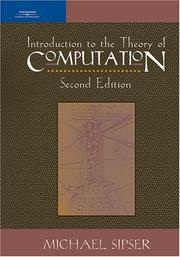
ISBN: 9780534950972 0534950973 Year: 2006 Publisher: Boston, Mass. Course Technology
Abstract | Keywords | Export | Availability | Bookmark
 Loading...
Loading...Choose an application
- Reference Manager
- EndNote
- RefWorks (Direct export to RefWorks)
Book
ISBN: 9782100499816 2100499815 Year: 2006 Publisher: Paris : Dunod,
Abstract | Keywords | Export | Availability | Bookmark
 Loading...
Loading...Choose an application
- Reference Manager
- EndNote
- RefWorks (Direct export to RefWorks)
Electronic data processing --- Recursive functions --- Computable functions --- Informatique --- Fonctions récursives --- Fonctions calculables --- Fonctions récursives --- Fonctions calculables. --- Decidability (Mathematical logic) --- Recursive functions. --- Turing machines. --- Formal languages --- Computable functions. --- Décidabilité (logique mathématique) --- Langages formels. --- Fonctions récursives. --- Automates mathématiques, Théorie des. --- Turing, Machines de. --- Computer science --- Décidabilité (logique mathématique) --- Fonctions récursives. --- Automates mathématiques, Théorie des.
Book
ISBN: 2738118585 9782738118585 Year: 2006 Publisher: Paris : Odile Jacob,
Abstract | Keywords | Export | Availability | Bookmark
 Loading...
Loading...Choose an application
- Reference Manager
- EndNote
- RefWorks (Direct export to RefWorks)
Qu’est-ce qui différencie un système complexe d’un système simple ? Comment peut-on étudier un système sans le réduire à ses constituants ? Comment peut-on décrire son fonctionnement s’il est chaotique ? Dans cette introduction qui fourmille d’exemples concrets, Hervé Zwirn décrit les mathématiques des systèmes complexes dans la vie et la société.
System theory --- Complexity (Philosophy) --- Biocomplexity --- Biomathematics --- Théorie des systèmes --- Complexité (Philosophie) --- Biocomplexité --- Biomathématiques --- Théorie des systèmes --- Complexité (Philosophie) --- Biocomplexité --- Biomathématiques --- Mathématiques --- Cellular automata. --- System theory. --- Biomathematics. --- Automates cellulaires. --- Algorithmes optimaux. --- Systèmes, Théorie des. --- Complexité (philosophie) --- Biomathématiques.
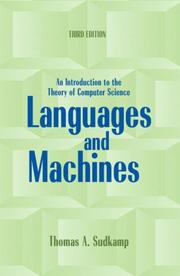
ISBN: 9780321322210 0321322215 Year: 2006 Publisher: Boston Pearson/Addison Wesley
Abstract | Keywords | Export | Availability | Bookmark
 Loading...
Loading...Choose an application
- Reference Manager
- EndNote
- RefWorks (Direct export to RefWorks)
The third edition of Languages and Machines: An Introduction to the Theory of Computer Science provides readers with a mathematically sound presentation of the theory of computer science at a level suitable for junior and senior level computer science majors. The theoretical concepts and associated mathematics are made accessible by a "learn as you go" approach that develops an intuitive understanding of the concepts through numerous examples and illustrations. In this edition the presentation has been enhanced by increasing the number of examples, expanding the selection of topics particularly in the area of computational complexity, and providing a flexible format giving instructors the ability to design their courses that concentrate on specific areas such as automata theory, computability theory, or computational complexity. [Publisher]
regeling machines --- Formal languages. --- Machine theory. --- Formalization (Linguistics) --- Langages formels. --- Automates mathématiques, Théorie des. --- Computational complexity --- Formal languages --- Machine theory --- 681.3*F4 --- Abstract automata --- Abstract machines --- Automata --- Mathematical machine theory --- Algorithms --- Logic, Symbolic and mathematical --- Recursive functions --- Robotics --- Language and languages --- Complexity, Computational --- Electronic data processing --- 681.3*F4 Mathematical logic and formal languages (Theory of computation) --- Mathematical logic and formal languages (Theory of computation) --- Machine elements --- Computer science --- Artificial intelligence. Robotics. Simulation. Graphics --- machines --- Computational Complexity --- Computational complexity. --- Complexité de calcul (informatique) --- Théorie des automates mathématiques
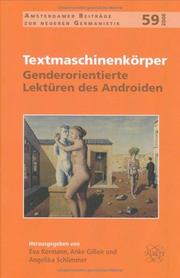
ISBN: 9042017783 1423787153 9781423787150 9789042017788 Year: 2006 Volume: 59 Publisher: Amsterdam ; New York, NY : Rodopi,
Abstract | Keywords | Export | Availability | Bookmark
 Loading...
Loading...Choose an application
- Reference Manager
- EndNote
- RefWorks (Direct export to RefWorks)
Textmaschinenko¨rper ist ein Neologismus, aufgebaut aus drei Lexemen, die, auf unterschiedliche Weise zu Neukombinationen verbunden - Textmaschine, Maschinenko¨rper, Textko¨rper -, jeweils das Sprachliche, Mechanische oder Leibliche betonen. Das Hyperonym der einzelnen Wo¨rter ist indes Konstruktion: Texte, Maschinen und Ko¨rper sind Artefakte, deren Herstellungsgeschichte und Wirkung zwar sehr unterschiedlich sein kann, aber deren Signum der menschlichen Konstruktion sie jeweils zu Elementen der Kulturpraxis im weitesten Sinn macht und deren Bedeutung immer wieder neu erfasst werden muss. Die unter dem Titel "Textmaschinenko¨rper" gesammelten Aufsa¨tze befassen sich mit der Darstellung des Maschinenko¨rpers in literarischen, filmischen und digitalen Texten. Sie analysieren Ko¨rper-, Geschlechter- und Menschenkonstruktionen, die auf einer Skala von Medien, vom schriftlich fixierten literarischen Text bis zur digitalen Vorstellung im Computerspiel, repra¨sentiert und thematisiert werden. Der Band pra¨sentiert erstmals dezidiert genderorientierte Analysen zum Motiv des ku¨nstlichen Menschen vor allem zur deutschsprachigen Literatur - von Automaten in der Dichtung des Mittelalters u¨ber Marionetten, Puppen und Automaten in der Romantik und in der Literatur des fin de sie`cle bis hin zu aktuellen Reflexionen u¨ber Ko¨rper, Technik und Reproduktion - und zur Variation des Motivs im Film des 20. Jahrhunderts - von Metropolis bis Matrix.
German literature --- Thematology --- Androids in literature --- Androiïden in de literatuur --- Androïdes dans la littérature --- Automata in literature --- Automaten in de literatuur --- Automates dans la littérature --- Humanoid robots in literature --- Humanoids in literature --- Robots dans la littérature --- Robots in de literatuur --- Robots in literature --- Androids in literature. --- Androids.
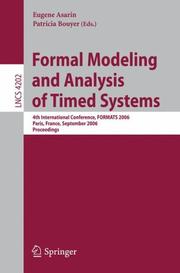
ISBN: 9783540450269 3540450262 3540450319 Year: 2006 Publisher: Berlin ; New York : Springer,
Abstract | Keywords | Export | Availability | Bookmark
 Loading...
Loading...Choose an application
- Reference Manager
- EndNote
- RefWorks (Direct export to RefWorks)
This volume contains the proceedings of the 4th International Conference on Formal Modelling and Analysis of Timed Systems (FORMATS 2006), held in Paris (France) on September 25-27, 2006. FORMATS aims to be a major annual event dedicated to the study of timed systems, uniting three independently started workshops: MTCS, RT-TOOLS, and TPTS. The first three FORMATS conferences were held in Marseille (2003), Grenoble (2004), and Uppsala (2005). Timing aspects of systems have been treated independently in separate scientific disciplines, and there is a growing awareness of the difficult problems common to all of them, suggesting the interdisciplinary study of timed systems. The unifying theme underlying all these domains is that they concern systems whose behavior depends upon combinations of logical and temporal constraints, e.g., constraints on the distance between occurrences of events. The aim of FORMATS is to promote the study of fundamental and practical aspects of timed systems, and to bring together researchers from different disciplines that share interests in modelling and analysis of timed systems. In this volume, there are articles on: – Foundations and Semantics: contributions to the theoretical foundations of timed systems and timed formal languages as well as comparison between different models used by different communities (timed automata, timed Petri nets, timed MSCs, hybrid automata, timed process algebra, timed temporal logics, timed abstract state machines, as well as probabilistic models). – Methods and Tools: techniques, algorithms, data structures, and software tools for analyzing timed systems and resolving temporal constraints (mod- checking, simulation, robustness analysis, scheduling, etc).
Computer simulation --- Temporal automata --- Formal methods (Computer science) --- Machine theory --- Simulation par ordinateur --- Automates temporels --- Méthodes formelles (Informatique) --- Automates mathématiques, Théorie des --- Congresses. --- Congrès --- Computer Science --- Engineering & Applied Sciences --- Computer science. --- Special purpose computers. --- Software engineering. --- Programming languages (Electronic computers). --- Computer logic. --- Computer Science. --- Logics and Meanings of Programs. --- Software Engineering. --- Programming Languages, Compilers, Interpreters. --- Special Purpose and Application-Based Systems. --- Computer science logic --- Logic, Symbolic and mathematical --- Computer languages --- Computer program languages --- Computer programming languages --- Machine language --- Electronic data processing --- Languages, Artificial --- Computer software engineering --- Engineering --- Special purpose computers --- Computers --- Informatics --- Science --- Automata, Temporal --- Logic design. --- Design, Logic --- Design of logic systems --- Digital electronics --- Electronic circuit design --- Logic circuits --- Switching theory --- Compilers (Computer programs). --- Computers, Special purpose. --- Computer Science Logic and Foundations of Programming. --- Compilers and Interpreters. --- Compiling programs (Computer programs) --- Computer programs --- Programming software --- Systems software
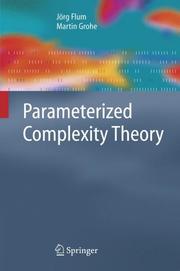
ISBN: 3540299521 9783540299523 3642067573 9786610625741 1280625740 354029953X Year: 2006 Publisher: Berlin Springer
Abstract | Keywords | Export | Availability | Bookmark
 Loading...
Loading...Choose an application
- Reference Manager
- EndNote
- RefWorks (Direct export to RefWorks)
Parameterized complexity theory is a recent branch of computational complexity theory that provides a framework for a refined analysis of hard algorithmic problems. The central notion of the theory, fixed-parameter tractability, has led to the development of various new algorithmic techniques and a whole new theory of intractability. This book is a state-of-the-art introduction to both algorithmic techniques for fixed-parameter tractability and the structural theory of parameterized complexity classes, and it presents detailed proofs of recent advanced results that have not appeared in book form before. Several chapters are each devoted to intractability, algorithmic techniques for designing fixed-parameter tractable algorithms, and bounded fixed-parameter tractability and subexponential time complexity. The treatment is comprehensive, and the reader is supported with exercises, notes, a detailed index, and some background on complexity theory and logic. The book will be of interest to computer scientists, mathematicians and graduate students engaged with algorithms and problem complexity.
Computer science --- Computational complexity. --- Algorithms. --- Complexité de calcul (Informatique) --- Algorithmes --- Nonlinear systems -- Mathematical models. --- System theory -- Mathematical models. --- Mathematics --- Physical Sciences & Mathematics --- Algebra --- Complexité de calcul (Informatique) --- EPUB-LIV-FT LIVINFOR SPRINGER-B --- Algorism --- Complexity, Computational --- Computer science. --- Architecture, Computer. --- Computers. --- Mathematical logic. --- Computer Science. --- Computer System Implementation. --- Mathematical Logic and Foundations. --- Algorithm Analysis and Problem Complexity. --- Theory of Computation. --- Computation by Abstract Devices. --- Mathematical Logic and Formal Languages. --- Arithmetic --- Foundations --- Electronic data processing --- Machine theory --- Computer network architectures. --- Logic, Symbolic and mathematical. --- Computer software. --- Information theory. --- Informatics --- Science --- Communication theory --- Communication --- Cybernetics --- Software, Computer --- Computer systems --- Algebra of logic --- Logic, Universal --- Mathematical logic --- Symbolic and mathematical logic --- Symbolic logic --- Algebra, Abstract --- Metamathematics --- Set theory --- Syllogism --- Architectures, Computer network --- Network architectures, Computer --- Computer architecture --- Automatic computers --- Automatic data processors --- Computer hardware --- Computing machines (Computers) --- Electronic brains --- Electronic calculating-machines --- Electronic computers --- Hardware, Computer --- Calculators --- Cyberspace --- Architecture, Computer --- Informatique --- Graphes, Théorie des --- Algorithmique --- Automates abstraits --- Complexite
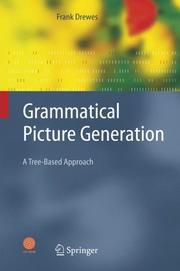
ISBN: 3540325077 354021304X 9783540213048 Year: 2006 Publisher: Berlin, Heidelberg : Springer Berlin Heidelberg : Imprint: Springer,
Abstract | Keywords | Export | Availability | Bookmark
 Loading...
Loading...Choose an application
- Reference Manager
- EndNote
- RefWorks (Direct export to RefWorks)
This book introduces the reader to the notions, the techniques, and the theory of grammatical picture generation, a research field focusing on formal systems that describe sets of pictures by means of syntactic rules. The book presents important types of picture generators, using a tree-based approach to stress their common algorithmic basis, the treatment influenced by the theory of computation, and the theory of formal languages in particular. It guides the reader through the basics of the tree-based approach on to dedicated chapters on line-drawing languages, collage grammars, iterated function systems, grid picture languages, languages of fractals, and languages of coloured collages, while presenting results about (un)decidable, NP-complete, or efficiently solvable problems, normal forms, hierarchies of language classes, and related phenomena. In support, the book contains detailed exercises throughout. The book is of interest to researchers and graduate students in computer science and mathematics who are engaged with the theory and practice of picture-generating systems.
Fractals. --- Computer drawing. --- Image processing --- Digital techniques. --- Digital image processing --- Digital electronics --- Computer graphics --- Drawing --- Fractal geometry --- Fractal sets --- Geometry, Fractal --- Sets, Fractal --- Sets of fractional dimension --- Dimension theory (Topology) --- Digital techniques --- Computer science. --- Information theory. --- Computer simulation. --- Computer graphics. --- Computer vision. --- Computer Applications. --- Theory of Computation. --- Mathematics of Computing. --- Simulation and Modeling. --- Computer Graphics. --- Image Processing and Computer Vision. --- Machine vision --- Vision, Computer --- Artificial intelligence --- Pattern recognition systems --- Automatic drafting --- Graphic data processing --- Graphics, Computer --- Computer art --- Graphic arts --- Electronic data processing --- Engineering graphics --- Computer modeling --- Computer models --- Modeling, Computer --- Models, Computer --- Simulation, Computer --- Electromechanical analogies --- Mathematical models --- Simulation methods --- Model-integrated computing --- Communication theory --- Communication --- Cybernetics --- Informatics --- Science --- Application software. --- Computers. --- Computer science—Mathematics. --- Optical data processing. --- Optical computing --- Visual data processing --- Bionics --- Integrated optics --- Photonics --- Computers --- Automatic computers --- Automatic data processors --- Computer hardware --- Computing machines (Computers) --- Electronic brains --- Electronic calculating-machines --- Electronic computers --- Hardware, Computer --- Computer systems --- Machine theory --- Calculators --- Cyberspace --- Application computer programs --- Application computer software --- Applications software --- Apps (Computer software) --- Computer software --- Optical equipment --- Informatique --- Computer science --- Langages formels --- Formal languages --- Formal languages. --- Automates abstraits
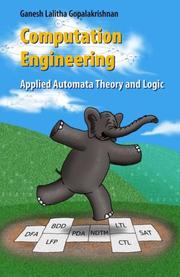
ISBN: 9780387244181 0387244182 0387325204 1441937412 Year: 2006 Publisher: New York, NY : Springer US : Imprint: Springer,
Abstract | Keywords | Export | Availability | Bookmark
 Loading...
Loading...Choose an application
- Reference Manager
- EndNote
- RefWorks (Direct export to RefWorks)
"This classroom-tested undergraduate textbook is unique in presenting logic and automata theory as a single subject...I highly recommend this book to you as the best route I know into the concepts underlying modern industrial formal verification." - Dr. Michael J.C. Gordon FRS, The University of Cambridge Computer Laboratory "This is a valuable book in my opinion. I learned a good deal from reading it, and encountered many attractive topic treatments and fresh insights, throughout. I certainly plan to add it to my reference shelf and recommend it to my students and colleagues. It covers automata in depth, providing good intuitions along the way, and culminating with applications that are used every day in the field. In this respect, it is a departure from the conventional textbooks on complexity and computability, although these 'traditional' aspects remain well represented. The book is well organized for coordinated use in several courses, ranging from core undergraduate to senior and graduate level topics." - Professor Steven D. Johnson, Indiana University.
Computer science --- Computer logic. --- Machine theory. --- Informatique --- Logique informatique --- Automates mathématiques, Théorie des --- Mathematics. --- Mathématiques --- Computer logic --- Machine theory --- Mathematics --- Computer science -- Mathematics. --- Electronic books. -- local. --- Computer Science --- Engineering & Applied Sciences --- Electrical & Computer Engineering --- Electrical Engineering --- Computer science logic --- Computer mathematics --- Discrete mathematics --- Electronic data processing --- Abstract automata --- Abstract machines --- Automata --- Mathematical machine theory --- Computer science. --- Computers. --- Mathematical logic. --- Electrical engineering. --- Electronic circuits. --- Computer Science. --- Theory of Computation. --- Circuits and Systems. --- Mathematical Logic and Formal Languages. --- Electrical Engineering. --- Algorithms --- Logic, Symbolic and mathematical --- Recursive functions --- Robotics --- Information theory. --- Systems engineering. --- Computer engineering. --- Informatics --- Science --- Engineering systems --- System engineering --- Engineering --- Industrial engineering --- System analysis --- Communication theory --- Communication --- Cybernetics --- Computers --- Design and construction --- Electric engineering --- Algebra of logic --- Logic, Universal --- Mathematical logic --- Symbolic and mathematical logic --- Symbolic logic --- Algebra, Abstract --- Metamathematics --- Set theory --- Syllogism --- Electron-tube circuits --- Electric circuits --- Electron tubes --- Electronics --- Automatic computers --- Automatic data processors --- Computer hardware --- Computing machines (Computers) --- Electronic brains --- Electronic calculating-machines --- Electronic computers --- Hardware, Computer --- Computer systems --- Calculators --- Cyberspace --- Computer science - Mathematics
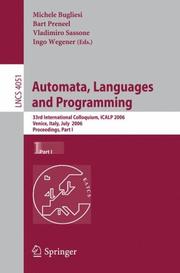
ISSN: 03029743 ISBN: 9783540359043 3540359044 9783540359074 3540359079 3540359052 3540359087 Year: 2006 Volume: 4052 Publisher: Berlin : Springer,
Abstract | Keywords | Export | Availability | Bookmark
 Loading...
Loading...Choose an application
- Reference Manager
- EndNote
- RefWorks (Direct export to RefWorks)
Machine theory --- Formal languages --- Computer programming --- Automates mathématiques, Théorie des --- Langages formels --- Programmation (Informatique) --- Congresses. --- Congrès --- Computer Science --- Algebra --- Engineering & Applied Sciences --- Mathematics --- Physical Sciences & Mathematics --- Computer science. --- Software engineering. --- Data structures (Computer science). --- Computers. --- Numerical analysis. --- Computer science --- Computer Science. --- Software Engineering/Programming and Operating Systems. --- Theory of Computation. --- Discrete Mathematics in Computer Science. --- Numeric Computing. --- Data Structures. --- Data Structures, Cryptology and Information Theory. --- Mathematics. --- Computer programming. --- Programming Techniques. --- Computer mathematics --- Discrete mathematics --- Electronic data processing --- Mathematical analysis --- Automatic computers --- Automatic data processors --- Computer hardware --- Computing machines (Computers) --- Electronic brains --- Electronic calculating-machines --- Electronic computers --- Hardware, Computer --- Computer systems --- Cybernetics --- Calculators --- Cyberspace --- Information structures (Computer science) --- Structures, Data (Computer science) --- Structures, Information (Computer science) --- File organization (Computer science) --- Abstract data types (Computer science) --- Computer software engineering --- Engineering --- Informatics --- Science --- Computers --- Electronic computer programming --- Electronic digital computers --- Programming (Electronic computers) --- Coding theory --- Programming --- Information theory. --- Computational complexity. --- Electronic data processing. --- Data structures (Computer scienc. --- Data Structures and Information Theory. --- ADP (Data processing) --- Automatic data processing --- Data processing --- EDP (Data processing) --- IDP (Data processing) --- Integrated data processing --- Office practice --- Complexity, Computational --- Communication theory --- Communication --- Automation --- Computer science—Mathematics. --- Discrete mathematics. --- Artificial intelligence—Data processing. --- Software Engineering. --- Numerical Analysis. --- Data Science. --- Discrete mathematical structures --- Mathematical structures, Discrete --- Structures, Discrete mathematical --- Numerical analysis
| Listing 1 - 10 of 12 | << page >> |
Sort by
|

 Search
Search Feedback
Feedback About UniCat
About UniCat  Help
Help News
News